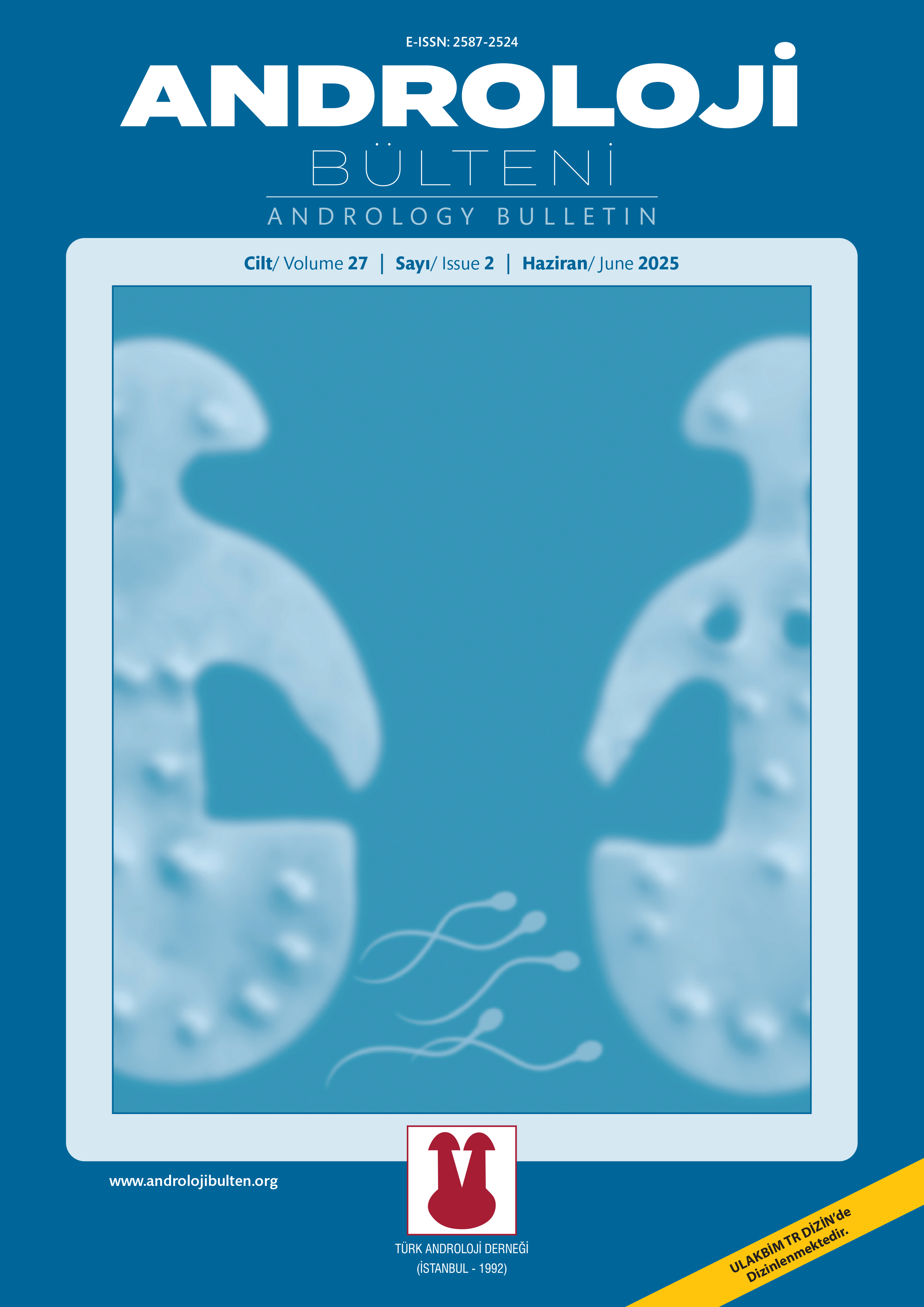
Bu derginin içeriği Creative Commons Atıf-GayriTicari 4.0 Uluslararası Lisansı kapsamında lisanslanmıştır.
Primer ve sekonder erkek infertilitesinin erektil fonksiyon ile ilişkisi
Fatih Fırat1, Ünal Öztekin21Tokat Devlet Hastanesi, Üroloji Bölümü, Tokat, Türkiye2Yozgat Bozok Üniversitesi Tıp Fakültesi, Üroloji Anabilim Dalı, Yozgat, Türkiye
AMAÇ: Bu çalışmanın amacı primer ve sekonder infertilite ile takip ve tedavi edilen ve cinsel işlev bozukluğuna sebep olabilecek organik patolojilerin olmadığı hasta gruplarında cinsel işlev fonksiyonlarını değerlendirmektir.
GEREÇ ve YÖNTEMLER: Üroloji polikliniğine başvuran 18-45 yaş arası 200 primer ve 76 sekonder infertil erkek hasta iki grup halinde retrospektif değerlendirilmiştir. İki grup arasında sosyodemografik (yaş, vücut kitle indeksi, sigara içme oranı, infertilite süresi) veriler, testosteron değerleri ve IIEF skorları karşılaştırıldı.
BULGULAR: Gruplar arasında yaş ortalamaları 29.4 (primer) ve 34.3 (sekonder) idi(p< 0.001). İnfertilite süresi sekonder infertil grupta istatistiksel olarak anlamlı yüksekti (p=0.019). IIEF skorları açısından gruplar arası anlamlı fark saptanmadı (p=0.959). Primer infertilite grubunda infertilite süresi ile IIEF skorları arasında negatif korelasyon mevcut iken, sekonder infertil grupta anlamlı korelasyon saptanmadı.
SONUÇ: Primer infertilite nedeni ile başvuran erkek hastalarda çiftlerin evlilik sürecini de etkileyebilecek cinsel disfonksiyon sorgulamasının yapılarak bu konuda danışmanlık verilmesini öneriyoruz.
The relationship between primary and secondary male infertility and erectile function
Fatih Fırat1, Ünal Öztekin21Tokat Devlet Hastanesi, Üroloji Bölümü, Tokat, Türkiye2Yozgat Bozok Üniversitesi Tıp Fakültesi, Üroloji Anabilim Dalı, Yozgat, Türkiye
OBJECTIVE: The aim of this study is to evaluate sexual functions in patients with primary and secondary infertility and in patients with organic pathologies that are not followed and treated and may cause sexual dysfunction.
MATRERIAL and METHODS: 200 primary and 76 secondary infertile male patients between the ages of 18 and 45 who applied to the urology outpatient clinic were retrospectively evaluated in two groups. Sociodemographic (age, body mass index, smoking rate, duration of infertility) data, testosterone values and IIEF scores were compared between the two groups.
RESULTS: The mean age of the groups was 29.4 (primary) and 34.3 (secondary) (p <0.001). The duration of infertility was statistically significantly higher in the secondary infertile group (p = 0.019). There was no significant difference between the groups in terms of IIEF scores (p = 0.995). While there was a negative correlation between the duration of infertility and IIEF scores in the primary infertility group, no significant correlation was found in the secondary infertile group.
CONCLUSION: We recommend counseling on this issue by making sexual dysfunction interrogations that may also affect the marriage process of couples in male patients who apply for primary infertility.
Makale Dili: Türkçe
(656 kere indirildi)













